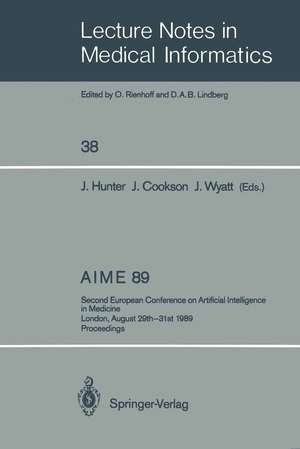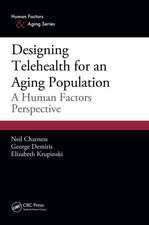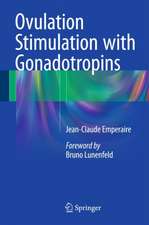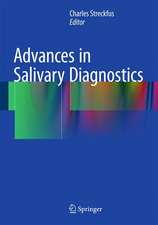AIME 89: Second European Conference on Artificial Intelligence in Medicine, London, August 29th–31st 1989. Proceedings: Lecture Notes in Medical Informatics, cartea 38
Editat de Jim Hunter, John Cookson, Jeremy Wyatten Limba Engleză Paperback – 15 aug 1989
Din seria Lecture Notes in Medical Informatics
- 5%
 Preț: 398.18 lei
Preț: 398.18 lei - 15%
 Preț: 631.53 lei
Preț: 631.53 lei - 5%
 Preț: 407.49 lei
Preț: 407.49 lei - 5%
 Preț: 705.11 lei
Preț: 705.11 lei - 15%
 Preț: 642.18 lei
Preț: 642.18 lei - 18%
 Preț: 944.82 lei
Preț: 944.82 lei - 5%
 Preț: 712.81 lei
Preț: 712.81 lei - 5%
 Preț: 412.42 lei
Preț: 412.42 lei - 15%
 Preț: 645.28 lei
Preț: 645.28 lei -
 Preț: 381.00 lei
Preț: 381.00 lei - 15%
 Preț: 640.88 lei
Preț: 640.88 lei - 5%
 Preț: 710.23 lei
Preț: 710.23 lei -
 Preț: 378.54 lei
Preț: 378.54 lei -
 Preț: 406.42 lei
Preț: 406.42 lei - 15%
 Preț: 640.24 lei
Preț: 640.24 lei - 5%
 Preț: 719.74 lei
Preț: 719.74 lei - 5%
 Preț: 750.10 lei
Preț: 750.10 lei - 5%
 Preț: 405.86 lei
Preț: 405.86 lei - 5%
 Preț: 712.81 lei
Preț: 712.81 lei - 5%
 Preț: 364.33 lei
Preț: 364.33 lei - 15%
 Preț: 639.59 lei
Preț: 639.59 lei - 15%
 Preț: 637.59 lei
Preț: 637.59 lei - 5%
 Preț: 713.33 lei
Preț: 713.33 lei - 15%
 Preț: 640.24 lei
Preț: 640.24 lei - 5%
 Preț: 363.60 lei
Preț: 363.60 lei - 5%
 Preț: 715.35 lei
Preț: 715.35 lei - 5%
 Preț: 716.45 lei
Preț: 716.45 lei - 5%
 Preț: 367.07 lei
Preț: 367.07 lei - 5%
 Preț: 737.32 lei
Preț: 737.32 lei - 5%
 Preț: 706.41 lei
Preț: 706.41 lei - 15%
 Preț: 632.70 lei
Preț: 632.70 lei - 5%
 Preț: 715.55 lei
Preț: 715.55 lei -
 Preț: 426.83 lei
Preț: 426.83 lei - 5%
 Preț: 711.52 lei
Preț: 711.52 lei - 15%
 Preț: 635.31 lei
Preț: 635.31 lei - 5%
 Preț: 721.05 lei
Preț: 721.05 lei -
 Preț: 444.13 lei
Preț: 444.13 lei - 5%
 Preț: 711.72 lei
Preț: 711.72 lei - 5%
 Preț: 374.41 lei
Preț: 374.41 lei - 5%
 Preț: 414.45 lei
Preț: 414.45 lei - 5%
 Preț: 366.56 lei
Preț: 366.56 lei - 15%
 Preț: 643.84 lei
Preț: 643.84 lei - 15%
 Preț: 642.03 lei
Preț: 642.03 lei
Preț: 721.05 lei
Preț vechi: 758.99 lei
-5% Nou
Puncte Express: 1082
Preț estimativ în valută:
137.99€ • 143.53$ • 113.92£
137.99€ • 143.53$ • 113.92£
Carte tipărită la comandă
Livrare economică 14-28 aprilie
Preluare comenzi: 021 569.72.76
Specificații
ISBN-13: 9783540515432
ISBN-10: 3540515437
Pagini: 344
Ilustrații: X, 330 p.
Dimensiuni: 170 x 242 x 18 mm
Greutate: 0.55 kg
Editura: Springer Berlin, Heidelberg
Colecția Springer
Seria Lecture Notes in Medical Informatics
Locul publicării:Berlin, Heidelberg, Germany
ISBN-10: 3540515437
Pagini: 344
Ilustrații: X, 330 p.
Dimensiuni: 170 x 242 x 18 mm
Greutate: 0.55 kg
Editura: Springer Berlin, Heidelberg
Colecția Springer
Seria Lecture Notes in Medical Informatics
Locul publicării:Berlin, Heidelberg, Germany
Public țintă
ResearchCuprins
Knowledge Elicitation and Acquisition.- The Role of Clinical Judgement Analysis in the Development of Medical Expert Systems.- The Development of a Knowledge System for Surveillance of Anti-Epileptic Medication.- Medical Analysis of Automatically Induced Diagnostic Rules.- Machine Learning as a Knowledge Acquisition Tool: Application in the Domain of the Interpretation of Test Results.- Architectures for Medical Knowledge-Based Systems (1).- A Model-Based Diagnostic Expert System for Skeletal Dysplasias.- KIDS: A Specialized Architecture for Medical Image Interpretation.- A Symbolic Theory of Decision-Making Applied to Several Medical Tasks.- Some Issues in the Control of Interactive Differential Diagnosis.- Clinical Applications (1).- Attributed Conditional Rewriting Systems as a Tool for ECG Description and Interpretation.- An Expert System for Automatic Phonomechanocardiographic Diagnosis.- Implementing ESTROPID: An Expert System for TROPIcal Diseases.- The Benefits of Expert Systems in Health Care. Practical Experiences from CATEG05-ES.- An Explanation Driven Architecture for a Knowledge Based System in Post-Operative Care.- Design of a Knowledge-Based Decision Support System for Anaesthesia Using Simulators Suporting Knowledge Acquisition and Validation.- Methodology (1).- Connectionist Models in Medicine: An Investigation of their Potential.- Therapy Planning by Combining AI and Decision Theoretic Techniques.- The Quantitative Management of Linguistic Terms in a Knowledge Engineering Tool: Application to Medical Reasoning.- Reasoning Based on Physiological Models.- A Qualitative Model of Iron Metabolism.- Qualitative Spatial and Temporal Reasoning in Cardiac Electrophysiology.- Implementation and Evaluation of a Knowledge-Based System for the Interpretation of Laboratory Data.- Simulating Generic Situations on Causal Models.- Clinical Applications (2).- A PC-Based Decision Support/Patient Management System for Thyroid Disease.- SADE — A Support Tool for the Diagnosis of Liver Diseases.- A Consultation System for Transplantation Medicine.- A Microcomputer-Based Expert System for the Explanation of Oliguria.- Architectures for Medical Knowledge-Based Systems (2).- Design of a Generic Information System and its Application to Primary Care.- A Knowledge System Architecture for Diagnostic Reasoning.- Uncertainty.- The ALARM Monitoring System: A Case Study with Two Probabilistic Inference Techniques for Belief Networks,.- General Session.- An Analysis of Uncertainty in British General Practice: Implications of a Preliminary Survey.- The Use of a Production System for Simulation Analysis of Tumour Cell Migration in vitro: Development of a Specialized Control Strategy.- GAUSS: A Generalised Approach to Updating Scanner Strategies.- Explanation Improvement to Enhance Acceptance of the PLEXUS System.- Methodology (2).- Diagnostic Decision Support Based on Generic Disease Descriptions and Detailed Anatomical Knowledge.- MEDES as a Tool for Different Reasoning Strategies.- Knowledge Acquisition using Syntactic Time Patterns.- A Concurrent Navigational System among Distributed Knowledge Sources.









